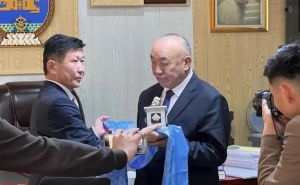
Under Assad, the main opponents of Syria remained the United States and Israel
According to a number of media outlets, Syrian President Bashar al-ASSAD left Damascus and went in an unknown direction after the advance of anti-government forces. A Kazinform News Agency correspondent found out how Bashar al-Assad managed to lead one of the most complex and conflict-ridden countries in the Middle East.
Bashar al-Assad has become one of the most controversial and long-ruling leaders in the Middle East. His path to power began in 2000, after the death of his father, Hafez al-Assad, who ruled Syria for almost 30 years - from 1971 to 2000.
The Syrian politician was born on September 11, 1965 in Damascus to Hafez al-Assad, a brigadier general, commander of the Syrian Air Force and Air Defense, and a member of the Arab Socialist Renaissance Party. In November 1970, after a military coup, his father, who held the post of Minister of Defense, came to power, and in March 1971 he was elected President of Syria.
According to lenta.ru, Bashar al-Assad was the third child in the family: he had an older sister Bushra, a brother Basel and two younger brothers - Maher and Majid. The father, Hafez al-Assad, was often absent from home due to his busy state affairs, and the children were raised by their mother, Anis, who came from the wealthy and influential Makhlouf clan. Members of the Hafez al-Assad family, unlike the president himself, rarely appeared in public and avoided unnecessary attention.
Open sources state that Bashar al-Assad received his primary and secondary education at the prestigious Arab-French Lyceum "Hurria" in Damascus. In 1982, he graduated from high school with a bachelor's degree. In 1988, Assad graduated with honors from the Faculty of Medicine at Damascus University, specializing in ophthalmology. After graduating, he began working at the Tishreen military hospital, located in the suburbs of Damascus.
In 1991 (according to other sources, in 1992), Bashar al-Assad went on an internship to the UK, where he studied at the Western Eye Hospital ophthalmology center in London. Abroad, he used a pseudonym to hide his connection with the Syrian president. He actively participated in scientific symposia and communicated with Syrian intellectuals, and also showed interest in computer science.
However, in February 1994, Bashar interrupted his internship and returned to Syria after the tragic death of his older brother Basel. On January 21, 1994, Basel, whom Hafez al-Assad had groomed as his successor, died in a car accident. After this tragedy, his father chose Bashar as the new candidate for successor, as the younger sons were not suitable for such responsible state and military functions.
After returning to Syria, Bashar al-Assad entered the military academy in Homs and was enrolled in the Republican Guard division with the rank of captain. His father assigned him experienced generals who provided him with individual military training. In five years of service, Bashar reached the rank of lieutenant colonel.
In parallel with his military career, Bashar al-Assad was involved in government activities. He became his father's political adviser, overseeing Syrian-Lebanese relations and the fight against corruption. After the death of Hafez al-Assad in 2000, Bashar was appointed supreme commander and nominated as a presidential candidate. The constitution was changed especially for him, lowering the minimum age of a candidate from 40 to 34. In June of the same year, he was elected president in a referendum, receiving 97.29% of the vote. In 2007, another referendum was held in Syria, as a result of which Bashar al-Assad was re-elected for a second term, receiving 97.62% of the vote.
His rule began with the promise of reforms and modernization. After coming to power, Assad faced the challenges of economic problems, political instability and demands for political reforms from the population, which he was in no hurry to implement.
Under Assad, the main opponents of Syria remained the United States and Israel. Washington's attitude began to change after the events of September 11, 2001, but after the start of the Iraq War in 2003, the United States again accused Syria of interfering in the conflict and supporting terrorists. In May 2004, George W. Bush imposed economic sanctions on Syria.
In 2011, when a wave of protests swept the Middle East as part of the so-called "Arab Spring", Syria also found itself at the center of protest sentiments demanding democratic change and an end to the Assad regime. In response to peaceful demonstrations, a brutal crackdown began, leading to a large-scale armed conflict that would eventually escalate into a civil war.
In 2021, despite ongoing military action in the country and international isolation, Bashar al-Assad was again elected president of Syria amid ongoing conflict and condemnation by Western countries. Assad was re-elected for a seven-year term - until 2028. He received 95.1% of the vote.
According to gazeta.ru, Bashar al-Assad has been married to Asma al-Akhras, a representative of an influential Sunni family from the city of Homs, since 2001. At the same time, the president himself is an Alawite Muslim. Assad has three children - two sons and a daughter.
Earlier, many foreign media outlets reported that Assad flew away from Damascus to an unknown destination on Sunday.
Photo credit: aa.com.tr.
YOU CAN SHARE YOUR OPINION AND DISCUSS THE ARTICLE ON OUR TELEGRAM CHANNEL!










